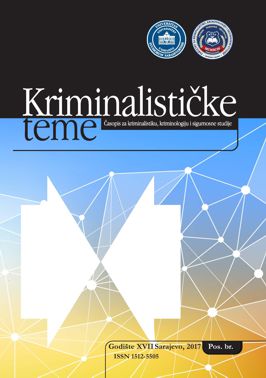BORBA PROTIV TERORIZMA U BOSNI I HERCEGOVINI – FUNKCIJA POLICIJSKIH AGENCIJA ILI OBAVJEŠTAJNE ZAJEDNICE
COUNTERTERRORISM IN BOSNIA AND HERZEGOVINA - A LAW ENFORCEMENT OR INTELLIGENCE FUNCTION
Author(s): Anel Ramić, Enis DžanićSubject(s): Security and defense, Criminology, Studies in violence and power, Peace and Conflict Studies
Published by: Fakultet za kriminalistiku, kriminologiju i sigurnosne studije Univerziteta u Sarajevu
Keywords: counter-terrorism; intelligence community; terrorism prevention; CT toolbox;
Summary/Abstract: Reason for writing and research problem(s): This paper analyses aspects of counterterrorism operations in Bosnia and Herzegovina and elsewhere; it analyzes goals of CT trough preventive, disruptive, investigative and penal aspects from one side, and legal instruments available in Bosnia and Herzegovina on the other side. The paper addresses success of various instruments in Bosnia and Herzegovina and elsewhere, especially negative side effects of certain repressive measures used by police agencies. We primarily address instruments that incite or support radicalization – instruments that target entire groups rather than individuals indicated as a terrorist threat, as well as instruments that expose methods and sources used by the intelligence community and police agencies, and thus have a detrimental effect on the capabilities of those agencies. Aims of the paper (scientific and/or social): The goal of this paper is to define a methodological approach for CT that will apply defined instruments against individuals and groups of CT interest, in order to prevent and obstruct terrorist activity and serve foreign CT entities Bosnia and Herzegovina cooperates with. Methodology/Design: Comparative approach and case studies are a primary methodological approach for this paper. Research/Paper limitation: The lack of full access to data about CT activities, especially ones carried out by OSA/OBA, is a basic limitation of this paper. Results: We expect to identify limiting factors of successful CT activities assuming current trends of use of police agencies are to be continued. This is primarily due to fragmentation of police agencies in Bosnia and Herzegovina, the lack of intelligence sharing, inadequacy of analytical function, and limited clandestine operational capabilities and experience of police agencies. General Conclusion: Intelligence community has to play a central role in CT activities rather than police agencies, since Bosnian intelligence service has necessary capabilities and tools, while police agencies have to play a supporting role, especially trough the criminal intelligence divisions established in all of the cantons in Federation in Bosnia and Herzegovina, Brcko District and Republic of Srpska.
Journal: Kriminalističke teme – Časopis za kriminalistiku, kriminologiju i sigurnosne studije
- Issue Year: XVII/2017
- Issue No: 5
- Page Range: 554-562
- Page Count: 9
- Language: Bosnian, English, Croatian

